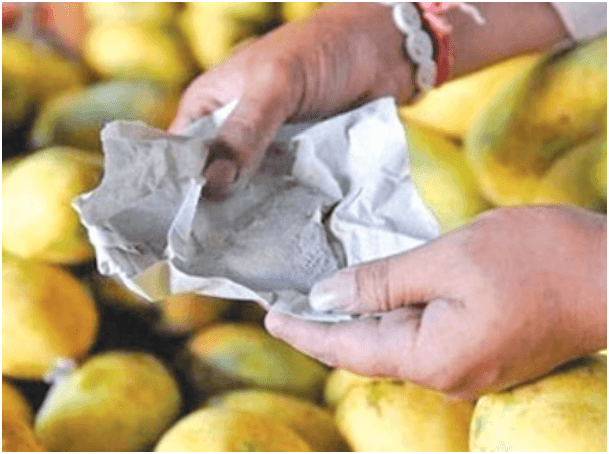FSSAI Alerts on Calcium Carbide Use for Ripening Mangoes; Protect Your Health
The Food Safety and Standards Authority of India (FSSAI) has issued a warning regarding the use of calcium carbide for ripening mangoes. This practice, while prevalent, poses significant health risks to consumers. This article delves into the dangers of calcium carbide, the legal landscape, and safer alternatives for ripening mangoes, aiming to inform and protect public health FSSAI has explicitly .
Understanding Calcium Carbide and Its Use in Ripening
What is Calcium Carbide?
Calcium carbide is a chemical compound with the formula CaC₂. When it comes into contact with moisture, it produces acetylene gas, which mimics the natural ripening process by releasing ethylene gas. This characteristic makes it a popular, albeit illegal, choice for artificially ripening fruits such as mangoes.
Why is it Used?
The main reason behind the use of calcium carbide is economic. It accelerates the ripening process, allowing farmers and traders to bring fruits to market faster. This rapid ripening can increase profits by ensuring that fruits reach consumers in a visually appealing, ripe state. However, this shortcut comes at a cost to consumer health.
Health Risks Associated with Calcium Carbide
Chemical Hazards
Calcium carbide is highly reactive and contains impurities such as arsenic and phosphorus, which can be hazardous to human health. The acetylene gas produced is not a natural ripening agent and can be harmful when inhaled or ingested.
Acute Health Effects
Exposure to calcium carbide can cause a range of immediate health issues. These include:
- Respiratory Problems: Inhalation of acetylene gas can lead to respiratory distress, including coughing, difficulty breathing, and chest pain.
- Gastrointestinal Distress: Ingesting fruits ripened with calcium carbide can cause nausea, vomiting, diarrhea, and abdominal pain.
- Neurological Symptoms: Symptoms such as dizziness, headache, and memory loss can occur due to exposure to the toxic compounds in calcium carbide.
Long-term Health Risks
Long-term consumption of fruits ripened with calcium carbide may lead to more severe health problems, including:
- Cancer: Prolonged exposure to arsenic and other carcinogenic impurities in calcium carbide can increase the risk of cancer.
- Neurological Disorders: Continuous intake of these toxic substances can lead to chronic neurological conditions, including cognitive impairment and memory loss.
Legal Framework and Regulations
FSSAI Regulations
The FSSAI has explicitly banned the use of calcium carbide for ripening fruits under the Food Safety and Standards (Prohibition and Restrictions on Sales) Regulations, 2011. The regulation states that “no person shall sell or offer for sale, or have in his possession any fruit ripened by the use of calcium carbide.”
Enforcement and Penalties
Enforcement of these regulations is critical to curbing the use of calcium carbide. The FSSAI, along with state food safety departments, conducts regular inspections and raids to identify and penalize offenders. Penalties for the use of calcium carbide include fines and imprisonment, aimed at deterring this illegal practice.
How to Identify Artificially Ripened Mangoes
Visual Inspection
Artificially ripened mangoes often exhibit certain visual cues:
- Uneven Ripening: The ripening process might be uneven, with some parts of the mango being overly ripe while others remain green.
- Black Patches: Presence of black or greyish patches on the skin, indicative of chemical burns from calcium carbide.
- Bright Yellow Color: An unusually bright yellow color might indicate artificial ripening.
Sensory Examination
- Smell: Artificially ripened mangoes might lack the natural sweet aroma of naturally ripened mangoes.
- Touch: These mangoes might feel softer than naturally ripened ones due to the accelerated ripening process.
Taste
The taste of artificially ripened mangoes can be a giveaway. They often lack the rich, sweet flavor of naturally ripened mangoes and may taste sour or bitter explained by FSSAI .
Safe Ripening Alternatives
Natural Ripening
Encouraging natural ripening processes is the safest method. Natural ripening can be achieved by:
- Ethylene Gas: Using ethylene gas in controlled environments can safely speed up the ripening process without harmful effects.
- Temperature Control: Storing mangoes at room temperature allows them to ripen naturally over a few days.
- Climacteric Ripening: Placing mangoes in a brown paper bag or a container with other climacteric fruits like bananas can enhance natural ripening through the ethylene gas emitted by the other fruits FSSAI has explicitly .
Organic Methods
- Using Rice or Hay: Placing mangoes in a container with rice or hay can facilitate natural ripening by retaining ethylene gas around the fruit.
- Traditional Methods: Some farmers use traditional methods such as wrapping mangoes in banana leaves to promote natural ripening.
Consumer Awareness and Responsibility
Educating Consumers
Consumer awareness is crucial in combating the use of calcium carbide. Educational campaigns can inform the public about the dangers of artificially ripened fruits and how to identify them. Consumers should be encouraged to purchase fruits from trusted sources that adhere to safety regulations.
Promoting Safe Practices
Consumers can promote safe ripening practices by:
- Buying Local: Supporting local farmers who use natural ripening methods.
- Demanding Quality: Insisting on quality and safety checks from sellers and marketplaces.
- Reporting Violations: Reporting suspected use of calcium carbide to food safety authorities.
The use of calcium carbide for ripening mangoes poses significant health risks and is illegal under FSSAI regulations. By understanding these dangers, identifying artificially ripened fruits, and promoting safe ripening alternatives, consumers can protect their health and support safer agricultural practices. Public awareness and strict enforcement of regulations are key to eliminating this hazardous practice and ensuring the safety of our food supply.
Stay informed with the latest updates-click here
